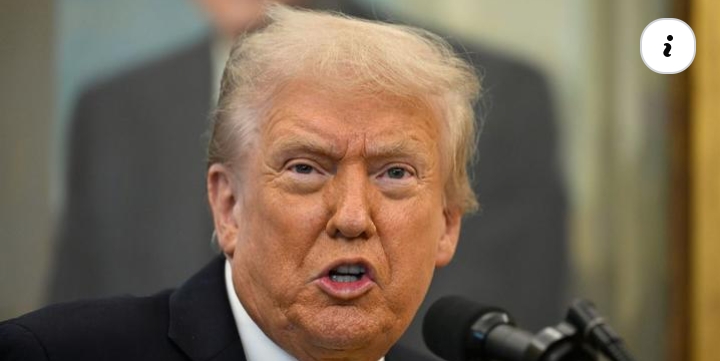NEWS
Donald Trump said that Venezuelan President Nicolas Maduro does not want to “f*** around” with the United States, in response to a reporter’s question,Which says….more details 👇 👇

Donald Trump said that Venezuelan President Nicolas Maduro does not want to “f*** around” with the United States, in response to a reporter’s question,Which says….more details 👇 👇
Trump’s blunt warning: “He doesn’t want to f*** around with the United States”
On October 17 2025, President Donald Trump told reporters that Venezuelan President Nicolás Maduro “doesn’t want to f*** around with the United States.”
The remark came during a press appearance at the White House alongside Ukraine’s President Volodymyr Zelenskyy, when Trump was asked about reports that Maduro had offered “everything” — including Venezuela’s natural resources — in hopes of securing a deal with the U.S. administration.
Fiji Broadcasting Corporation
What Trump said
When asked by a reporter: “Maduro has offered everything in his country, all the natural resources. He even recorded a message to you in English recently, offering mediation,” Trump replied:
“He has offered everything. He’s offered everything, you’re right. You know why? Because he doesn’t want to f*** around with the United States.”
realclearpolitics.com
In effect, Trump argued that Maduro’s overtures were less about diplomacy and more about avoiding a tougher U.S. posture — that is, a fear of escalating conflict or other American responses.
Context: escalating U.S.–Venezuela tensions
There are several key pieces of context to understand why Trump’s statement comes at this moment:
The U.S. has dramatically increased its military and intelligence posture around Venezuela. That includes naval assets, warplanes, and special‑operations capabilities in the Caribbean and near Venezuelan waters.
Fiji Broadcasting Corporation
The Trump administration has labelled the Maduro regime as a narco‑trafficking state, accusing it of enabling drug flows to the U.S. and other illicit activities.
www.ndtv.com
The report Trump referenced suggested that Maduro’s government had floated giving the U.S. access to Venezuela’s natural‑resource wealth (oil, gold, minerals) as part of a deal to de‑escalate tensions. Trump claims these offers were made because Maduro was seeking to avoid confrontation.
The Guardian
Some analysts interpret the U.S. posture as potentially involving regime‑change dynamics, even though the administration denies that is its explicit goal.
TIME
Significance of the language
Trump’s use of the expletive (“f*** around”) is notable for both tone and implication:
It underscores a highly adversarial posture — less diplomatic nuance, more blunt warning.
It signals to both domestic and international audiences that the U.S. may be prepared to act if its red‑lines are crossed or if its interests — whether drug interdiction or regional influence — are threatened.
It indirectly communicates to Caracas that despite any offers from Maduro, the leverage currently lies with Washington — the “you don’t want to mess with us” message.
The choice of language may also reflect domestic political signaling: tough stance, clear messaging.
Possible interpretations & implications
Maduro’s alleged “offer everything” move could be interpreted not only as concession‑seeking but as an effort to stave off U.S. military or covert intervention. Trump’s framing suggests he believes Maduro is worried about U.S. action.
However, the U.S. rejecting those offers could indicate that Washington does not (solely) want resource access but aims for more strategic objectives — possibly regime change, increased control over narco‑trafficking flows, or reshaping regional alliances.
For Venezuela, such rhetoric greatly raises the stakes: confrontation with the U.S. could lead to expanded covert, military, or economic action. Maduro’s regime will have to decide whether to continue accommodation efforts, escalate defense preparations, or seek third‑party mediation.
For U.S. foreign policy, this episode adds to a pattern of more aggressive and less diplomatic rhetoric in Latin America and elsewhere, which may have consequences for credibility, alliances, and the norm of negotiation over confrontation.
Risks and caveats
While Trump’s comments and actions suggest readiness for stronger measures, full‑scale intervention would carry major legal, logistical, strategic, and humanitarian risks.
Venezuela’s government denies these offers and accuses Washington of planning regime‑change, which raises questions of U.S. action being seen as imperial or violating sovereignty.
www.ndtv.com
+1
There is also the question of evidence: U.S. claims about drug‑trafficking links and Maduro’s offers must be weighed against independent verification and international law.
The language trap: blunt phrasing may rally some audiences but alienate others and complicate diplomatic back‑channels that might reduce tension.
What to watch going forward
Whether the U.S. accepts or counters any further overtures from Venezuela or Maduro’s government — will Washington insist on regime change or be open to some form of negotiated transition?
Any escalation of U.S. military or covert operations inside or near Venezuela — especially operations crossing into land territory, which Trump alluded to.
Responses from Venezuela’s allies in the region (e.g., Russia, China, Iran) and how they might react if the U.S. moves more aggressively.
The domestic political ramifications for Trump — whether this stance boosts support among those wanting a tough foreign‑policy posture, or spurs criticism over risks of foreign entanglements.
Humanitarian and migration impacts if tensions escalate: large flows of Venezuelans, economic collapse in Venezuela, or heightened conflict might affect neighbouring states and U.S. domestic issues.
Conclusion
President Trump’s statement that









